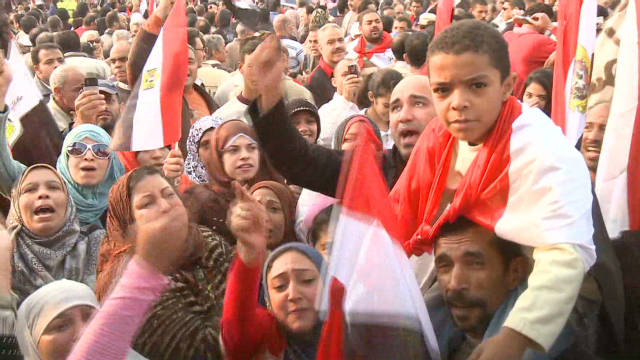November 26, 2011 -- Updated 1312 GMT (2112 HKT)

Anti-Tahrir Square protest in Egypt
STORY HIGHLIGHTS
- Officials apologize for the death of a protester struck by a police truck
- At least 42 people have died from clashes over the past week
- Egypt's parliamentary elections are set to begin Monday
- Ex-prime minister Kamal Ganzouri regains his post
"We issued a statement of apology for the death and expressed our condolences" to the family of 19-year-old Ahmed Suroor, said Interior Ministry spokesman Gen. Marwan Mustapha.
The most recent clashes started when police tried to remove protesters who were blocking the entrance of the Parliament building in anticipation of the arrival of newly-appointed Prime Minister Kamal Ganzouri, according to Sarah Abdelrahman, an activist at the scene.
Many of the protesters participating in the sit-in were sleeping at the time. At least one Molotov cocktail was seen flying from the protesters, and police fired tear gas amid the unrest.
According to the spokesman, "Four police trucks were passing by the area of the sit-in because they took wrong turn ... The protesters started throwing rocks, and one Molotov cocktail hit the trucks."
In addition to the fatality of the protester, 10 people were injured in the same incident, Ministry of Health spokesman Dr. Hisham Shiha said.
The latest violence came as the country remains divided over the ruling military body and news that Ganzouri, a former prime minister from an ousted regime, had regained his old role.
Ganzouri, who served as prime minister under President Hosni Mubarak, reclaimed the post Friday as competing protests drew tens of thousands of demonstrators in the capital.
Ganzouri told reporters that Hussein Tantawi, field marshal of the Supreme Council of the Armed Forces, "made it clear to me he is no longer willing to stay in power. If he told me otherwise, I'd not have accepted to take this role."
Ganzouri said he had asked for time to form a cabinet "that will be accepted by everyone." He took the job after Egypt's military rulers asked him to form a government of "national salvation."
The development came days after Prime Minister Essam Sharaf and his government quit en masse and three days before parliamentary elections, scheduled to begin Monday. The high military council decided Friday to extend voting to two days for each stage of the election, according to state-run Egypt TV.
"Of course, the new government cannot be formed before Monday's parliamentary elections," Ganzouri said.
Ballot boxes will be locked at 7 p.m. Monday and new boxes will be used on Tuesday, Ahmed Al Zind, head of Judicial Club, told reporters Saturday. "The ballot box for the judge is like a part of his body," Al Zind said. "Even though police and army will secure ballots, the judge is responsible. "
In all, 4,765 judges will monitor the three rounds of elections, he said. They will report any violations to the Higher Committee of the Election Commission, Al Zind added.
Ganzouri, who was Egypt's prime minister from 1996 to 1999, is to remain prime minister until at least January 10, when results of the parliamentary elections are finalized, said Aly Hassan, a judicial consultant. After that, Parliament would have to back Ganzouri for him to retain the position.
The Alliance of the Revolutionaries of Egypt had wanted Mohamed ElBaradei, a 2005 Nobel Peace Prize winner and a frontrunner for the presidency of Egypt, to take over as prime minister, said coalition member Musad Ibrahim.
Ibrahim criticized the choice of Ganzouri, citing his age and asserting that "all his projects (in government) were failures." Ganzouri is 78, according to the Egyptian government website.
"The security council wants someone they can control, and Ganzouri is their man," Ibrahim said.
Ganzouri takes the helm at a time of tremendous change, which he acknowledged in a news conference, saying Friday that his new responsibilities "are a lot more than I ever had ever before."
Ganzouri's appointment was not well received by some demonstrators, hundreds of whom blocked the entrance to the Cabinet headquarters in protest, according to Dr. Karim El Kholy, a dentist who had flown from Michigan to join the protests.
Pro-military demonstrators offered a different point of view Friday in Cairo's Abbasiya Square.
There, some supporters of the Supreme Council of the Armed Forces held a banner that said, "To the defenders of the nation, we say thank you."
Others chanted, "The army and the people are one!"
But pro-military voices in Cairo were largely drowned out by those of protesters in Tahrir Square, who called for the interim military rulers to step down. The square was the epicenter of the movement that led to Mubarak's ouster as president nine months ago.
Tens of thousands of people massed in Cairo's Tahrir Square on Friday.
The death toll over the past week has reached 42, including at least 33 in Cairo. An additional 3,250 have been wounded, the Ministry of Health's Shiha said.
He said many of the casualties had been shot by "live ammunition, rubber bullets and birdshot."
Egypt's military leaders apologized Thursday for the deaths of protesters, vowing to prosecute offenders and pay the medical bills of the wounded.
"The Supreme Council of the Armed Forces presents its regrets and deep apologies for the deaths of martyrs among Egypt's loyal sons during the recent events in Tahrir Square," said the message, which was posted on the council's Facebook page. "The Supreme Council of the Armed Forces confirms that it is making every sincere effort to prevent such events from happening again."
Next week's elections will be observed by a delegation from the International Republican Institute as well as a U.S. congressional delegation "to identify and evaluate strengths and weaknesses in Egypt's election system, including campaign regulations, the balloting process, vote tabulation and reporting," the institute said Friday.
CNN's Ian Lee, Ben Wedeman, Saad Abedine and Ivan Watson contributed to this report.


No comments:
Post a Comment